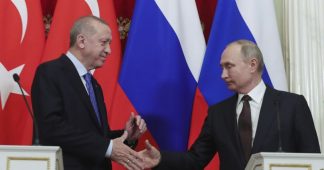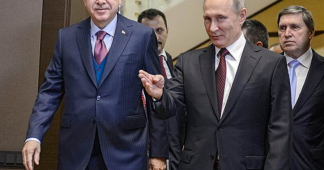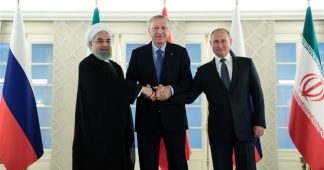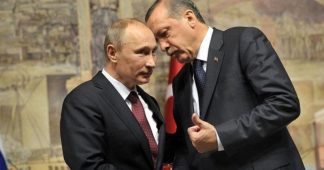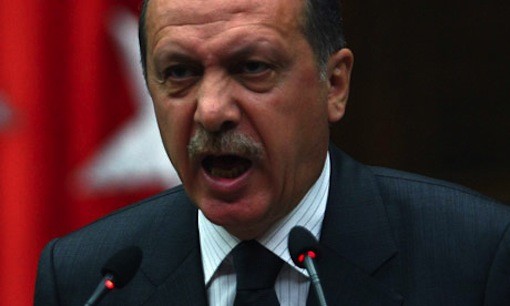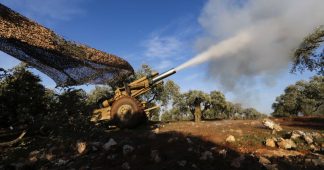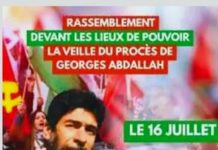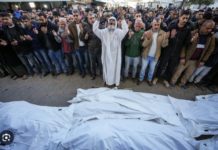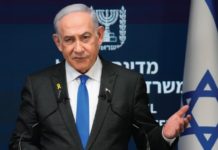By Murat Yetkin
6 March 2020
It is a cliché to say “a photo tells a thousand words” but it is true most of the time. Does this photo taken when the doors opened after talks between Turkish President Tayyip Erdoğan and his Russian host Vladimir Putin at the Kremlin tell anything positive and promising to you?
A face-to-face or “restricted format” talk for 5 hours and 40 minutes between the two leaders, or any other leaders, is a lot. Whether it be at such times of crisis and after days long negotiations between the high-level diplomats, military and intelligence officers of both countries in Ankara, in Moscow and again in Ankara for the last two weeks amid bloody clashes in Syria.
In the end, there was a rather shorter session with the participation of high-rank officials including foreign and defense ministers of both countries. Then Turkish Foreign Minister Mevlüt Çavuşoğlu and Russian Foreign Minister Sergey Lavrov read in the presence of their leaders a three-article joint protocol.
1- All military activities “along the line of contacts” [in Syria] to stop as of midnight March 6,
2- A “secure corridor to be established 6 km to the north and 6 km to the south of the M4 highway (connecting Latakia on the Mediterranean coast to the M5 highway connecting Aleppo to Damascus),
3- Joint Russian-Turkish patrols to start within this corridor as of March 15.
Agree to disagree?
Such a statement should be considered as a minimum after such a long and obviously detailed talk in order to achieve three goals:
1- To guarantee that at least Turkish and Russian forces should not confront each other and avoid unwanted clashes,
2- To pretend a ceasefire (whose parties are not clear) in order not to come out of the meeting empty handed which would be embarrassing,
3- To keep Turkish-Russian relations especially in the field of energy and weapons trade which are both beneficial to Russia.
On the other hand, there are three major discrepancies between the stances of the two leaders.
1- The “ceasefire” is not even called as an official ceasefire, which usually takes place between two fighting parties. It is called the termination of “all military activities,” which naturally suggests not only the Turkish and Russian sides, but also the Syrian regime and activities of all other non-state groups, other than terrorist groups. There are question marks whether Russia and Turkey could take Syrian army or all other groups under full control. Turkish media broadcast footage when Erdoğan, as he was shaking Lavrov’s hand, was asking to Çavuşoğlu whether Russians “called Assad already.” The lack of trust is obvious,
2- Putin said before the meeting that nobody was told about the positions of Turkish troops before the fatal attack by the Syrian jets on Feb. 27 which killed 34 Turkish soldiers. He also told Charles Michel, the head of the European Union Council, right before meeting with Erdoğan on the phone that Idlib “aggravation was provoked by terrorist groups”. (Michel was in Turkey on March 4 in order to talk to Erdoğan about Ankara’s move to open up borders to Greece, which put pressure on all European governments, Germany in particular.) But Erdoğan says the clashes have been provoked by pro-Assad groups and Syrian regime forces,
3- Erdoğan says Turkey holds the right to retaliate the attacks of the Syrian regime forces and Putin says it will continue to fight the terrorists, whereas the definition of who is terrorist and who is not is not hundred percent same for Ankara and Moscow.
Also, the statement mentions a “line of contact” but it is not clearly stated whether it is the Sochi line that Turkey has been insisting, also to lift the siege around -reportedly- 10 of its 12 monitoring posts around Idlib or the line of clashes as of midnight March 6.
It is as if Erdoğan and Putin have agreed to disagree but do not see necessary to say this openly in order to claim that this lose-lose situation is actually a win-win.
Outcome and possible consequences
First the outcomes of the crisis and the meet:
1- Erdoğan could not take much from Putin, but Putin-backed Assad forces could not take Idlib back thanks to the heavy retaliatory offence of the Turkish military,
2- What is left out of the Syrian army got major damage as a result of the Turkish operation called “Spring Shield.” Turkish army capabilities, including the armed UAVs, were seen on the ground as Russia did not directly intervene.
3- The NATO and U.S. support to Turkey in its retaliatory attacks against Syria played a key role in Russia’s repositioning itself. This has marked a breaking of ice between Tuırkey and the U.S. was has gone thicker since 2014 Kobani incident.
And possible consequences are:
1- It should be considered as a success if the “ceasefire” holds until March 15, when joint Turkish-Russian patrols will supposedly start. If so, it means that Assad is in a more difficult position than before the Idlib crisis and understands that it will not be possible for him to escape from the Geneva Conference,
2- It may cause a temporary slowdown in rush of Syrians to Turkish border, but hardly slow down their rush from Turkey to European countries. The EU will have to find a way to cut a new deal with Turkey as the NATO Secretary General Jens Stoltenberg suggested on March 5, as the Erdoğan-Putin talk was going on,
3- Erdoğan will have to find a way to normalize relations with his European and American allies, considering that it can no longer rely on a permanent relationship with Russia. Perhaps it is the end of the “Shift of Axis” story, after “Neo-Ottoman” story as the West would like to see, which could hopefully mark the end of over-ambitious foreign policy moves towards the 10th anniversary of the Arab Spring which caused a major disarray in the Middle East.
It would not be fair to say that the mountain has brough forth a mouse regarding Erdoğan-Putin talk in Moscow, but it would not be right to say that it changed the balances much. The question remains unanswered in minds: Was that all Erdoğan and Putin got after 5 hours 40 minutes of talk?
Published at https://yetkinreport.com/en/2020/03/06/was-that-all-putin-and-erdogan-got-after-5-hours/
